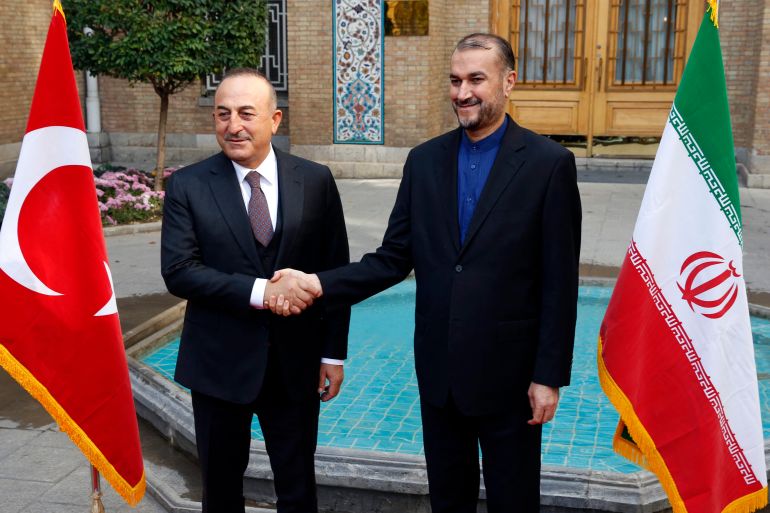Iran, Turkey hope to sign ‘cooperation road map’ in Erdogan visit
After meeting his Turkish counterpart, Iran’s foreign minister says the road map will aim to boost bilateral ties.

Tehran, Iran – Iran and Turkey will continue high-level diplomatic talks to draft a “long-term cooperation road map” to boost ties, Foreign Minister Hossein Amirabdollahian has announced.
“We hope to finalise the road map in a future visit to Tehran by Mr [Recep Tayyip] Erdogan, the eminent Turkish president,” Amirabdollahian said on Monday, standing next to Turkish Foreign Minister Mevlut Cavusoglu at a news conference in Tehran, without announcing a specific date for the visit.
Keep reading
list of 4 itemsIran deporting thousands of Afghan refugees
Aid group says 4,000-5,000 Afghans crossing into Iran daily
Iran’s failure to tackle climate change – a question of priority
This was the first high-level visit to Iran by a Turkish official since President Ebrahim Raisi began his first term in office about three months ago. It was also the first visit Amirabdollahian has received since testing positive for COVID-19 in early November.
The Iranian foreign minister said he and Cavusoglu discussed bilateral ties, the region – especially Afghanistan – and international relations.
As “pragmatic” governments, he said, Tehran and Ankara agreed to work together to remove barriers on the way of expanding trade, energy, environment and consular ties while also facilitating private sector trade.
“I’d like to emphasise that the two countries’ relations are deep, historical and intimate, and in developing these ties, we will pay special attention to this,” Amirabdollahian added.
Cavusoglu began by expressing his sympathies for the death and damage caused by Sunday’s earthquakes near Bandar Abbas, in which one person died and dozens were injured.
To underline that the talks went well, he referred to a poem by the late celebrated poet Sohrab Sepehri, titled Where Is the Friend’s Home?
“I have always seen the friend’s home in Tehran,” the foreign minister said.
On Afghanistan, Cavusoglu said the two countries’ views have much in common. Turkey is highly concerned about the humanitarian situation in the Taliban-ruled country and believes the formation of an inclusive government is the solution, he said.
“We are ready to cooperate on Afghanistan. But in addition to our regional cooperation, we’d like to improve our international ties with Iran, and today’s meetings will accelerate development of relations,” Cavusoglu said.
The foreign minister also touched on Iran’s 2015 nuclear deal with world powers, saying Turkey welcomes the fact that participants will head to Vienna on November 29 to resume talks aimed at restoring it.
Cavusoglu said restoring the Joint Comprehensive Plan of Action (JCPOA), as the deal is formally known, could not only boost economic ties between the two countries but also help improve regional security.
Unilateral United States sanctions imposed on Iran since 2018 when then-President Donald Trump abandoned the accord are “cruel”, Cavusoglu said, and the US must come back to the agreement and lift the sanctions.
South Caucasus
Cavusoglu later met with President Raisi, who told him the two countries should develop their bilateral relations on all fronts to the benefit of their people.
Raisi said Iran believes that the region is capable of addressing its own issues without foreign intervention, which only leads to instability and tensions.
“That is true just as it is true that 20 years of US presence in Afghanistan led to nothing but murder, bloodshed and destruction, and it became clear that Afghanistan’s problems can be solved by the hands of its own people with the help of neighbours,” he said.
Raisi also pointed to the South Caucasus, saying Iran, Turkey and Azerbaijan have historical ties and share religious bonds, so they should not allow “some foreign movements” to tarnish their relations.
He was referring to tensions between Iran and Turkey-backed Azerbaijan over its ties to Israel.
Cavusoglu was quoted as saying by the president’s website that Ankara wishes to boost ties with Tehran, and also looks to work with Iran to ensure stability and improve trade in the South Caucasus. He also welcomed cooperation on fighting “terrorism” and ensuring regional security.